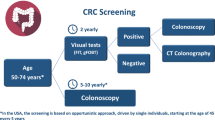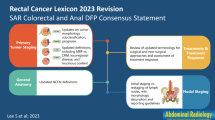Abstract
Purpose of Review
The following review is to assess the current methods, both non-invasive and invasive, in colorectal cancer screening and discuss novel screening techniques.
Recent Findings
Colorectal cancer continues to affect millions of people across the world. Through increased and widespread adoption of various screening methods, the rates of colon cancer-related deaths are decreasing. However, this decline has not been observed worldwide, possibly due to the lack of widespread screening adoption. Although there are many methods for screening colorectal cancer, colonoscopy remains the gold standard, due to high sensitivity and specificity as well as the ability to immediately sample or remove concerning tissue. Blood-based molecular testing is the most recent advancement in colorectal cancer screening; however, it has a significantly lower sensitivity and specificity when compared to other methods. However, with continued investigation, blood-based molecular testing may change how we screen for colorectal cancer in the near future.
Summary
Several options for colorectal cancer screening exist today. Colorectal cancer screening methods and techniques have improved over the last several decades. These improvements have helped to decrease the rates of colorectal cancer-related deaths, most notably in the USA. Various organizations have provided a list of recommendations and suggested screening agendas, which will be reviewed in this discussion.

Similar content being viewed by others
References
Papers of particular interest, published recently, have been highlighted as: • Of importance •• Of major importance
Haggar FA, Boushey RP. Colorectal cancer epidemiology: incidence, mortality, survival, and risk factors. Clin Colon Rectal Surg. 2009;22(4):191–7.
Siegel RL, Miller KD, Jemal A. Cancer statistics, 2018. CA Cancer J Clin. 2018;68(1):7–30.
Cronin KA, et al. Annual Report to the Nation on the Status of Cancer, part I: National cancer statistics. Cancer. 2018;124(13):2785–800.
Maxim LD, Niebo R, Utell MJ. Screening tests: a review with examples. Inhal Toxicol. 2014;26(13):811–28.
Simkin J, et al. Differences in colorectal cancer screening rates across income strata by levels of urbanization: results from the Canadian Community Health Survey (2013/2014): Can J Public Health; 2018;110(1):62–71.
Rex DK, et al. American College of Gastroenterology guidelines for colorectal cancer screening 2009 [corrected]. Am J Gastroenterol. 2009;104(3):739–50.
Shapiro JA, et al. Patterns of colorectal cancer test use, including CT colonography, in the 2010 National Health Interview Survey. Cancer Epidemiol Biomark Prev. 2012;21(6):895–904.
Colorectal Cancer Facts & Figures 2017-2019., A.C. Society, Editor. 2017; Atlanta.
Gupta S, et al. Comparative effectiveness of fecal immunochemical test outreach, colonoscopy outreach, and usual care for boosting colorectal cancer screening among the underserved: a randomized clinical trial. JAMA Intern Med. 2013;173(18):1725–32.
Force, U.S.P.S.T, et al. Screening for colorectal cancer: US Preventive Services Task Force recommendation statement. JAMA. 2016;315(23):2564–75.
Qaseem A, et al. Screening for colorectal cancer: a guidance statement from the American College of Physicians. Ann Intern Med. 2012;156(5):378–86.
Wolf AMD, et al. Colorectal cancer screening for average-risk adults: 2018 guideline update from the American Cancer Society. CA Cancer J Clin. 2018;68(4):250–81.
Andrews JC, et al. GRADE guidelines: 15. Going from evidence to recommendation-determinants of a recommendation’s direction and strength. J Clin Epidemiol. 2013;66(7):726–35.
Lin JS, et al. Screening for colorectal cancer: updated evidence report and systematic review for the US Preventive Services Task Force. JAMA. 2016;315(23):2576–94.
Huerta S. Recent advances in the molecular diagnosis and prognosis of colorectal cancer. Expert Rev Mol Diagn. 2008;8(3):277–88.
Hill MJ, Morson BC, Bussey HJR. Aetiology of adenoma-carcinoma sequence in large bowel. Lancet. 1978;1(8058):245–7.
Vogelstein B, Fearon ER, Hamilton SR, Kern SE, Preisinger AC, Leppert M, et al. Genetic alterations during colorectal-tumor development. NEJM. 1988;319(9):525–32.
Winawer SJ. The history of colon cancer screening: a personal perspective. Dig Dis Sci. 2015;60(3):596–608.
Gervaz P, Usel M, Rapiti E, Chappuis P, Neyroud-Kaspar I, Bouchardy C. Right colon cancer: left behind. Eur J Surg Oncol. 2016;42(9):1343–9.
Committee, A.S.o.P, et al. Complications of colonoscopy. Gastrointest Endosc. 2011;74(4):745–52.
CY 2018 Medicare Fee Schedule Changes (National Estimates), C.f.M.a.M. Services, Editor. 2018.
Ahlquist DA, et al. The stool DNA test is more accurate than the plasma septin 9 test in detecting colorectal neoplasia. Clin Gastroenterol Hepatol. 2012;10(3):272–7 e1.
Nguyen MT, Weinberg DS. Biomarkers in colorectal cancer screening. J Natl Compr Cancer Netw. 2016;14(8):1033–40.
Scholefield JH, et al. Nottingham trial of faecal occult blood testing for colorectal cancer: a 20-year follow-up. Gut. 2012;61(7):1036–40.
Shaukat A, et al. Long-term mortality after screening for colorectal cancer. N Engl J Med. 2013;369(12):1106–14.
Allison JE, et al. Population screening for colorectal cancer means getting FIT: the past, present, and future of colorectal cancer screening using the fecal immunochemical test for hemoglobin (FIT). Gut Liver. 2014;8(2):117–30.
Church TR, Ederer F, Mandel JS. Fecal occult blood screening in the Minnesota study: sensitivity of the screening test. J Natl Cancer Inst. 1997;89(19):1440–8.
Lang CA, Ransohoff DF. Fecal occult blood screening for colorectal cancer. Is mortality reduced by chance selection for screening colonoscopy? JAMA. 1994;271(13):1011–3.
Lee JK, et al. Accuracy of fecal immunochemical tests for colorectal cancer: systematic review and meta-analysis. Ann Intern Med. 2014;160(3):171.
Syngal S, et al. Detection of stool DNA mutations before and after treatment of colorectal neoplasia. Cancer. 2006;106(2):277–83.
Bailey JR, Aggarwal A, Imperiale TF. Colorectal cancer screening: stool DNA and other noninvasive modalities. Gut Liver. 2016;10(2):204–11.
Imperiale TF, et al. Multitarget stool DNA testing for colorectal-cancer screening. N Engl J Med. 2014;370(14):1287–97.
Rank KM, Shaukat A. Stool based testing for colorectal cancer: an overview of available evidence. Curr Gastroenterol Rep. 2017;19(8):39.
• Prince M, et al. Multitarget stool DNA tests increases colorectal cancer screening among previously noncompliant Medicare patients. World J Gastroenterol. 2017;23(3):464–71 An important cross-sectional study with real-world applications demonstrating how a multitarget stool DNA test can significantly improve colorectal cancer screening.
Christofk HR, et al. The M2 splice isoform of pyruvate kinase is important for cancer metabolism and tumour growth. Nature. 2008;452(7184):230–3.
Tonus C, et al. Faecal pyruvate kinase isoenzyme type M2 for colorectal cancer screening: a meta-analysis. World J Gastroenterol. 2012;18(30):4004–11.
Kim YC, et al. The usefulness of a novel screening kit for colorectal cancer using the immunochromatographic fecal tumor M2 pyruvate kinase test. Gut Liver. 2015;9(5):641–8.
Uppara M, et al. A systematic review and meta-analysis of the diagnostic accuracy of pyruvate kinase M2 isoenzymatic assay in diagnosing colorectal cancer. World J Surg Oncol. 2015;13:48.
Hoff G, et al. Testing for faecal calprotectin (PhiCal) in the Norwegian Colorectal Cancer Prevention trial on flexible sigmoidoscopy screening: comparison with an immunochemical test for occult blood (FlexSure OBT). Gut. 2004;53(9):1329–33.
Widlak MM, et al. Diagnostic accuracy of faecal biomarkers in detecting colorectal cancer and adenoma in symptomatic patients. Aliment Pharmacol Ther. 2017;45(2):354–63.
Patel PM, Harris K, Huerta S. Clinical and molecular diagnosis of pathologic complete response in rectal cancer. Expert Rev Mol Diagn. 2015;15(11):1505–16.
Ramzan Z, Nassri AB, Huerta S. Genotypic characteristics of resistant tumors to pre-operative ionizing radiation in rectal cancer. World J Gastrointest Oncol. 2014;6(7):194–210.
Timmerman C, Taveras LR, Huerta S. Clinical and molecular diagnosis of pathologic complete response in rectal cancer: an update. Expert Rev Mol Diagn. 2018;18(10):887–96.
Gupta S, et al. Challenges and possible solutions to colorectal cancer screening for the underserved. J Natl Cancer Inst. 2014;106(4):dju032.
Ladabaum U, et al. Colorectal cancer screening with blood-based biomarkers: cost-effectiveness of methylated septin 9 DNA versus current strategies. Cancer Epidemiol Biomark Prev. 2013;22(9):1567–76.
deVos T, et al. Circulating methylated SEPT9 DNA in plasma is a biomarker for colorectal cancer. Clin Chem. 2009;55(7):1337–46.
Grutzmann R, et al. Sensitive detection of colorectal cancer in peripheral blood by septin 9 DNA methylation assay. PLoS One. 2008;3(11):e3759.
Warren JD, et al. Septin 9 methylated DNA is a sensitive and specific blood test for colorectal cancer. BMC Med. 2011;9:133.
Church TR, et al. Prospective evaluation of methylated SEPT9 in plasma for detection of asymptomatic colorectal cancer. Gut. 2014;63(2):317–25.
Chen CH, Yan SL, Yang TH, Chen SF, Yeh YH, Ou JJ, et al. The relationship between the methylated septin-9 DNA blood test and stool occult blood test for diagnosing colorectal cancer in Taiwanese people. J Clin Lab Anal. 2017;31(1). https://doi.org/10.1002/jcla.22013
Jin P, et al. Performance of a second-generation methylated SEPT9 test in detecting colorectal neoplasm. J Gastroenterol Hepatol. 2015;30(5):830–3.
Nicoloso MS, et al. MicroRNAs—the micro steering wheel of tumour metastases. Nat Rev Cancer. 2009;9(4):293–302.
Marshall KW, et al. A blood-based biomarker panel for stratifying current risk for colorectal cancer. Int J Cancer. 2010;126(5):1177–86.
• Bray C, et al. Colorectal cancer screening. WMJ. 2017;116(1):27–33 The development of a risk-stratification tool using molecular testing with exciting implications for streamlined colorectal cancer screening.
Ganepola GA, et al. Use of blood-based biomarkers for early diagnosis and surveillance of colorectal cancer. World J Gastrointest Oncol. 2014;6(4):83–97.
Wang S, et al. A plasma microRNA panel for early detection of colorectal cancer. Int J Cancer. 2015;136(1):152–61.
Yiu AJ, Yiu CY. Biomarkers in colorectal cancer. Anticancer Res. 2016;36(3):1093–102.
Fan C, Lei X, Wu FX. Prediction of CircRNA-disease associations using KATZ model based on heterogeneous networks. Int J Biol Sci. 2018;14(14):1950–9.
Chen H, et al. Head-to-head comparison and evaluation of 92 plasma protein biomarkers for early detection of colorectal cancer in a true screening setting. Clin Cancer Res. 2015;21(14):3318–26.
Chen H, et al. Prospective evaluation of 64 serum autoantibodies as biomarkers for early detection of colorectal cancer in a true screening setting. Oncotarget. 2016;7(13):16420–32.
Issa IA, Noureddine M. Colorectal cancer screening: an updated review of the available options. World J Gastroenterol. 2017;23(28):5086–96.
Werner S, et al. Evaluation of a 5-marker blood test for colorectal cancer early detection in a colorectal cancer screening setting. Clin Cancer Res. 2016;22(7):1725–33.
Li D. Recent advances in colorectal cancer screening. Chronic Dis Transl Med. 2018;4(3):139–47.
•• Check-CapAbbounces FDA Conditional Approval of IDE to Initiate U.S. Pilot Study of C-Scan. 2018 1/4/2019]; Available from: http://ir.check-cap.com/2018-12-13-Check-Cap-Announces-FDA-Conditional-Approval-of-IDE-to-Initiate-U-S-Pilot-Study-of-C-Scan-R Exciting news announcing the initiation of a pilot study regarding preparation-free capsule-based colorectal cancer screening.
Outsense Toilet IOT Sensor. 1/4/2019]; Available from: https://outsense.co.il/.
Hornbrook MC, et al. Early colorectal cancer detected by machine learning model using gender, age, and complete blood count data. Dig Dis Sci. 2017;62(10):2719–27.
•• Urban G, et al. Deep learning localizes and identifies polyps in real time with 96% accuracy in screening colonoscopy. Gastroenterology. 2018;155(4):1069–78 e8 Important machine-learning algorithms to improve polyp detection during colonoscopy, making invasive testing more effective.
DeBourcy AC, et al. Community-based preferences for stool cards versus colonoscopy in colorectal cancer screening. J Gen Intern Med. 2008;23(2):169–74.
Ho W, et al. Analysis of barriers to and patients’ preferences for CT colonography for colorectal cancer screening in a nonadherent urban population. AJR Am J Roentgenol. 2010;195(2):393–7.
Holden DJ, et al. Systematic review: enhancing the use and quality of colorectal cancer screening. Ann Intern Med. 2010;152(10):668–76.
Pignone M, Bucholtz D, Harris R. Patient preferences for colon cancer screening. J Gen Intern Med. 1999;14(7):432–7.
Ruffin MTt, et al. Factors influencing choices for colorectal cancer screening among previously unscreened African and Caucasian Americans: findings from a triangulation mixed methods investigation. J Community Health. 2009;34(2):79–89.
Wolf RL, et al. Patient preferences and adherence to colorectal cancer screening in an urban population. Am J Public Health. 2006;96(5):809–11.
Inadomi JM, et al. Adherence to colorectal cancer screening: a randomized clinical trial of competing strategies. Arch Intern Med. 2012;172(7):575–82.
Author information
Authors and Affiliations
Corresponding author
Ethics declarations
Conflict of Interest
The authors declare that they have no conflict of interest.
Human and Animal Rights and Informed Consent
This article does not contain any studies with human or animal subjects performed by any of the authors.
Additional information
Publisher’s Note
Springer Nature remains neutral with regard to jurisdictional claims in published maps and institutional affiliations.
This article is part of the Topical Collection on Surgery and Surgical Innovations in Colorectal Cancer
Rights and permissions
About this article
Cite this article
Bhatt, D.B., Emuakhagbon, VS. Current Trends in Colorectal Cancer Screening. Curr Colorectal Cancer Rep 15, 45–52 (2019). https://doi.org/10.1007/s11888-019-00432-4
Published:
Issue Date:
DOI: https://doi.org/10.1007/s11888-019-00432-4




